Angina pectoris definition is described as a chest pain that is caused by a diminished supply of blood to the heart because of a lesion on the walls or valves of the heart, or an obstruction by way of narrowing of the coronary arteries. Because of this obstruction or damage, the heart receives a lower amount of oxygen than it needs to function properly. This is known as ‘ischemia’.
Unhealthy lifestyles and the consequences of such are a factor for having angina such as: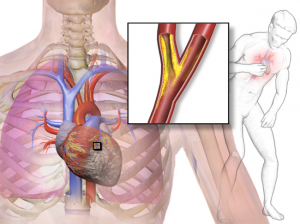
- smoking
- heavy drinking
- eating junk food
- lack of exercise
- high blood pressure
- being overweight or obese
- diabetes
- all the above cause chronic stress to the body
- the risks increase as you get older
- Magnesium deficiency
What are the symptoms of angina?
The condition can be very painful for some but others complain of being uncomfortable rather than in bad pain. This discomfort is often described as a tightness or heaviness, squeezing, choking or burning feeling. Quite often, there is pain in the abdomen, back, neck and jaw area as well as the upper arms and shoulders.
Commonly, angina is caused by exertion or emotional stress. It can be worsened when having a full stomach and sometimes by cold temperatures. Breathlessness is a common symptom as is nausea and sweating. Blood pressure can rise along with the pulse rate. If the pain only lasts a few seconds or minutes then it’s probably not angina.
It could be the phenomenom known as ‘precordial catch syndrome’ also known as ‘Texidor’s twinge’. I will be elaborating on this condition in a later post because it does worry many people, despite is being completely harmless.
Stable, unstable and prinzmetal’s angina
There are three types of angina – stable, unstable and prinzmetal’s. Stable angina is the most common and symptoms usually last for a few minutes before they subside, often with the help of nitroglycerine tablets.
With unstable angina the symptoms can be more severe and not so predictable. The attacks often last much longer and can occur even at times of rest. An unstable attack can be a precursor to a heart attack and thus it is taken more seriously than stable angina. Medical attention should be sought immediately at the first sign of unstable angina.
Prinzmetal’s, is defined as angina that occurs when the patient is at rest, rather than the result of physical exercise. Dr James Pierce Ph.D., relates that he’s identified the cause of this angina. He says that it generally occurs at certain times of the day, in the early morning and late afternoon.(1) These are, as it happens, the times of day when Mg is at its lowest ebb in the body.
Dr Pierce estimates that some 50% of sudden heart attacks may be due to Mg deficiency. He himself suffered with chest pain mainly brought on by stress and he could even predict an attack depending on the stress he’d been under during the day. He didn’t use nitroglycerine to eleviate symptoms, he found that Mg worked much more efficiently and under stressful conditions, he would up his dose to stave off an attack.
How is angina pectoris diagnosed?
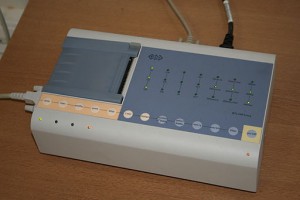
As angina pectoris could be a precursor for a heart attack your cardiologist will want to diagnose as to how serious it is. This will probably initially be by way of an electrocardiogram (ECG) which will detect any signs of ischemia. An ECG reading can be normal despite angina being present. If this is suspected, a stress test will be conducted using activities such as walking on a treadmill or using an exercise bike.
Other tests can be used such as a stress echocardiogram which uses ultrasound imaging of your heart whilst exercise stress testing which will record any abnormalities of heart contractions. There is also the nuclear heart scan which involves a radioactive substance like ‘thallium’ or ‘cardiolite’ being injected into the bloodstream. An external camera then tracks the trace material as it goes through the system and through the veins and the heart. Two tests are usually done, one with the body under stress as explained above and another later on when the heart is at rest. These tests will show if there are any problems with your heart muscle or any blood flow blockages.
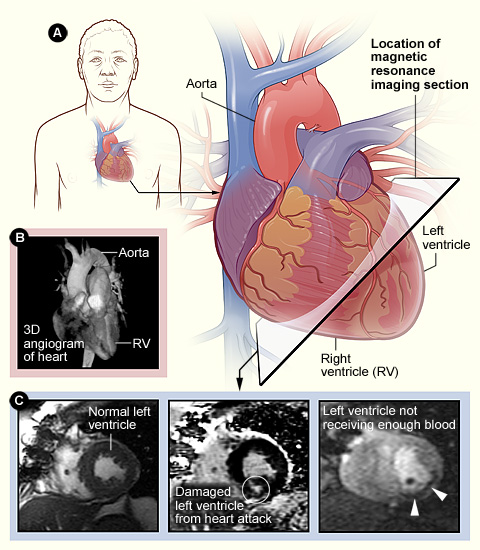
Other tests conducted are angiograms. This is a noninvasive test to diagnose angina. Another procedure is cardiac catheterization which is regarded as very accurate. Also, if a problem is found, immediate treatment is administered by way of a stent which is placed in the trouble spot allowing the support of the damaged artery and re-establishing normal blood flow.
If the tests do not show any serious problems but angina is present, then your doctor or cardiologist will probably give you advice on changing your lifestyle habits. A healthy diet, more exercise and reducing stress, help for smokers to give up and reducing alcohol intake for heavy drinkers, will probably make a vast improvement. Nitroglycerin tablets or sprays may be prescribed and sometimes ‘beta blockers’. Calcium channel blockers may be given to lower blood pressure.
Angina Pectoris and Magnesium (Mg) Deficiency
Why are we always looking for new drugs and compounds when the real stars of natural nutrients are overlooked and in some cases positively ignored. You only have to use common sense to realise that actually, natural substances have been with us since time began, so why is it we dismiss them out of hand and why would we think they’re not important to our health any more.
It is a simple fact, that the alkaline element Mg is absolutely vital for the health of us humans as well as all other life. Even so, we ignore it at our peril and become sick because of its deficiency within us.
One of the most important side effects of Mg deficiency is angina pectoris. The deterioration process of the heart and arteries can be summarized as follows:
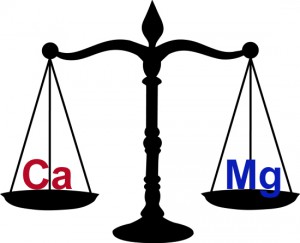 Stress – one of the primary causes of Mg deficiency. This can be due to many life experiences such as personal stressors, medical stressors, prescription drugs, lack of nutrients, exposure to toxins.
Stress – one of the primary causes of Mg deficiency. This can be due to many life experiences such as personal stressors, medical stressors, prescription drugs, lack of nutrients, exposure to toxins.- An electrolyte imbalance and loss of energy develops, particularly with the Mg:Ca ratio being weighted heavily towards Ca.
- This inbalance causes stress to the cardiovascular system with the heart muscle being impaired and/or blood vessels being damaged.
- Plaque and calcium deposits build up in the arteries and heart.
- Angina pectoris and other heart conditions start to manifest. Other conditions could include: heart arrhythmia, atherosclerosis, cardiac arrest, heart attack, hypertension, stroke and death!
The importance of Mg-ATP
For us all to be able to function, every one of our 100 trillion cells has to produce and use a substance called adenosine triphosphate or ATP. Mitochondria which reside in our cells are cellular factories that manufacture ATP. ATP is used throughout the body as an energy source. It is the fuel of our cells and is the power source for all functions including transmitting nerve impulses which make our muscles work. For ATP to work properly it has to be joined by the cofactor Mg. Mg ions bind to ATP molecules to produce a new compound called Mg-ATP. Mg essentially activates ATP and without Mg, ATP cannot be used by the cells. Mg brings ATP to life! Without Mg our cells would be unable to function and carry out the processes necessary to sustain our bodies.
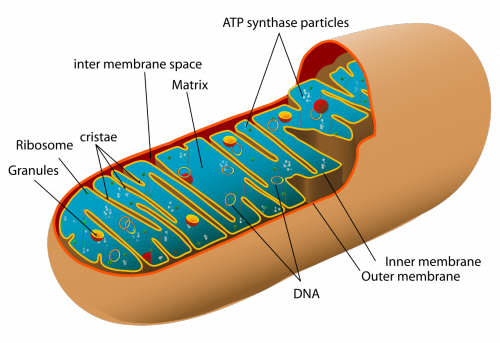
When ATP is discussed or mentioned or written about, the activated ATP should be called Mg-ATP but unfortunately the Mg bit has been dropped which has not done us any favours. It does mean that Mg is not given the important status it deserves. In research papers and medical books, the correct terminology of Mg-ATP is usually used.
Simply stated, mitochondria produce Mg-ATP, and Mg-ATP is absolutely essential for survival. Without a sufficient generation of Mg-ATP, life would cease to exist.
Dr Dennis Goodman MD an eminent cardiologist, describes in detail in his book ‘Magnificent Magnesium‘ the problems caused to the cardiovascular system because of the prevalence of Mg deficiency in the world today. This is a must read if you want to know about your heart health and keep it in good order.
 Have you been diagnosed with angina? If so, I would like to hear from you. Your experiences would be helpful to other sufferers. Do you take a Mg supplement to keep your Mg levels up and retain a healthy cardiovascular system?
Have you been diagnosed with angina? If so, I would like to hear from you. Your experiences would be helpful to other sufferers. Do you take a Mg supplement to keep your Mg levels up and retain a healthy cardiovascular system?
- Pierce JB, Heart Healthy Magnesium: Your Nutritional Key to Cardiovascular Wellness, Avery Publishing Group, New York, 1994
Spread the word!
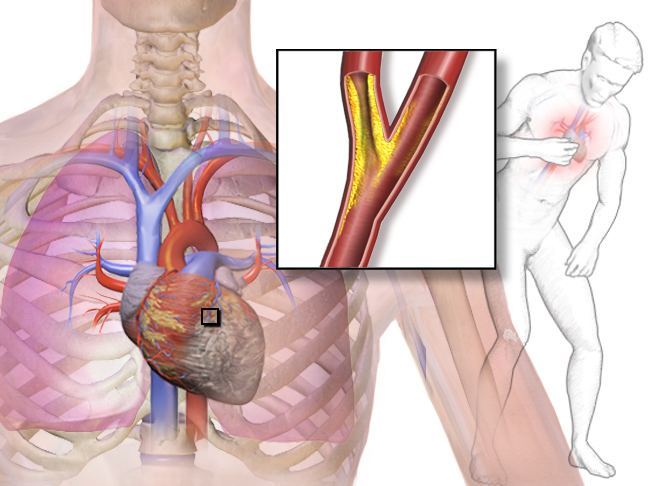
The human body is so complex, and as such, requires careful care and attention. It’s so easy to get caught up with day to day life and forget about this important organism that is always with us.
Interesting. I never associated neck and back pain with heart issues. I need to pay more attention to the warning signs. Exercise is always good. Is it possible to develop angina pectoris by over exerting oneself with too much exercise?
If fifty percent of heart attacks can indeed be traced to lack of magnesium, I’ll happily take some extra magnesium every day. This could be quite significant. Good point about unnecessarily looking for new drugs and new types of treatment. I believe that we do have what we need, and we just need to accept that. The earth produces an incredible amount of natural healing elements. I like the brief summary at the end, this is always a great way to enhance retention of information. Thanks for the good information.
Hi there and thanks for reading the article. Yes, you’re right. We are under such a lot of stress and worry with our everyday lives that we tend to forget that our bodies could be suffering because of it. If we did not depend so much on our medics and looked into our own health, we could perhaps benefit greatly.
Over exertion can be a problem but not only if you have angina. There have been many athletes who have died of ‘sudden cardiac death syndrome’ because of Mg deficiency, – http://magnesiumandhealth.com/magnesium-and-working-out/ If you do have angina, it is a warning sign that there is a decreased supply of blood to the heart and/or there is a narrowing of the coronary arteries. If caught early, lifestyle changes maybe all that’s needed to alleviate symptoms. It’s up to us to listen to our own bodies and take time out to keep healthy for ourselves and our families. Good luck to you and stay healthy! Ches Power
Based on my understanding, Angina Pectoris leads to a problem called ‘ischemia’?
Looking at the symptoms, seems to me that it’s a health issue which aligns with other diseases the fact that it relates to diseases like diabetes.
About the diagnosis, what is the best way in this aspect as it seems there are numbers of ways to diagnose it.
Hi there Tar. Yes, you’re right, angina is a warning sign that there is a constriction of blood flow which means the heart receives less oxygen, a condition called ischemia. It can indeed relate to other problems such as diabetes and ischaemic heart disease or coronary heart disease (CHD) is the biggest killer in the world today.
As there are two types of angina, the first diagnosis will be which type. The most common is ‘stable angina’ which typically lasts around 5 minutes or so, ‘unstable angina’ is a more serious condition with symptoms that are more severe and lasting much longer. Usually an electrocardiogram (EKG) is done to record the electrical activity of the heart and detect signs of ischemia and changes in the heart muscle caused by a lack of oxygen. These are usually the first steps of diagnosis. Exercise stress tests may also be done.
Thanks for reading the article and keep healthy! Ches Power
I knew that angina pectoris was chest pain but its good to know that it can also be characterized by discomfort. Thanks for the list on what can cause this health problem, I know that I need to change some things in my life to ensure optimum health and longevity. I know others will need the reminder as well. Thanks!
Thanks Luke for reading the article. I hope you will try Magnesium (Mg), you will likely feel the benefit in just a few days as well as the extra energy you will gain. This page – http://magnesiumandhealth.com/best-magnesium-supplements/ will show you the different Mg supplements there are but I do recommend the Mg chloride for maximum bioavailability. Mg citrate along with some other types of Mg salts can be laxative, which does actually benefit those with digestive problems. Good health and good luck to you. Ches Power